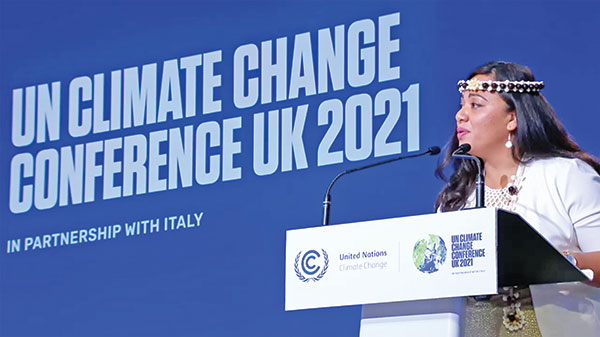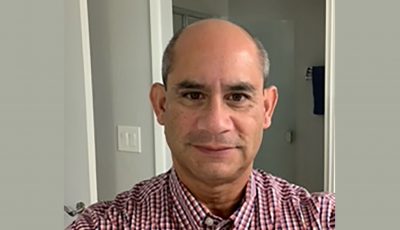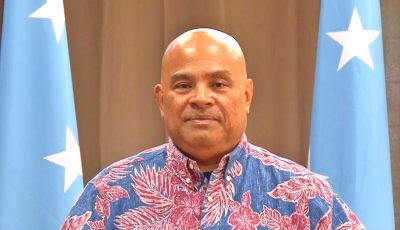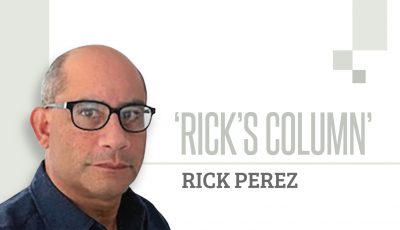Babauta introduces Obama at COP26

This frame grab shows Rep. Sheila Babauta (D-Saipan) as she introduces former U.S. president Barack Obama before his speech yesterday at the COP26 climate summit in Glasgow, Scotland. (CONTRIBUTED PHOTO)
Rep. Sheila Babauta (D-Saipan) made waves yesterday at the COP26 climate summit in Glasgow, Scotland as she introduced former U.S. president Barack Obama before he took the stage to speak.
Obama acknowledged Babauta in his speech and thanked the representative for all the work that she has been doing in the Marianas, which he referred to as “a part of the world that is feeling the effects of climate change right now.”
“Thank you for making what sometimes can seem a bunch of abstract numbers painfully, immediately real,” the former president added.
Serving as the chair of the House Natural Resources Committee, Babauta is an alumna of the Obama Foundation Leadership Program–Asia Pacific Region, and is at the United Nations climate change conference to raise global awareness and consciousness on environmental protection, and to gather allies from and for indigenous communities around the world.
In her introduction, Babauta presented herself as a daughter of the Mariana Islands, born and raised on Saipan, an island next to Marianas Trench, the deepest point of the world’s ocean.
“I am here to amplify the voices of those who live on the frontlines. On my island, storms are now unpredictable and frequently turned into super typhoons strong enough to impact our economy, destroy homes, and create fear at the very sound of wind gusts, and heavy rain, all while our shoreline continues to disappear,” she said.
“We are not passive victims,” Babauta stressed before an audience of world leaders. “As the first stewards of the land and ocean, our traditional knowledge can guide the way. All together we hold the keys to solving the issues of militarization, climate change, and climate colonialism.”
The legislator also highlighted Obama as a son of the Asia Pacific, who has an understanding of the indigenous people’s deep connections to the land, and who recognizes that communities impacted by climate change must have a seat at the table to ensure accountability and action from all parties who contribute major carbon emissions.
“We know it is up to us,” Babauta said, highlighting the role younger people play in addressing climate change concerns. “We have the wisdom of our elders, the enthusiasm of our youth who have taken their place as leaders in this movement. We must recognize and respect this leadership and see it for the renewable resource that it is.”
A video of Babauta’s introduction of Obama was widely shared in the CNMI yesterday.
COP26 is not Babauta’s first meeting with Obama. In December 2019, the legislator caught the former president’s attention with her question on military presence in the Pacific Islands, during the Obama Foundation Leadership Program plenary held in Kuala Lumpur, Malaysia.
Babauta will remain at the COP26 in Glasgow, Scotland until Friday, where she will be attending panels to speak about militarization in the Pacific, among others, along with other Pacific island leaders.
***
Obama faults Russia, China
GLASGOW, Scotland (AP)—Barack Obama expressed confidence at U.N. climate talks Monday that the Biden administration will ultimately get its $555 billion climate package through Congress, and faulted U.S. rivals China and Russia for what he called a “dangerous lack of urgency” in cutting their own climate-wrecking emissions.
As nations complained of lagging trust and progress in the climate talks, Obama, one of the leaders who paved the way for the historic 2015 Paris climate deal, threw in a touch of his trademark hope but admitted that “images of dystopia” were creeping into his dreams.
“There are times where the future seems somewhat bleak. There are times where I am doubtful that humanity can get its act together before it’s too late,” Obama said at the two-week-long negotiations. “(But) we can’t afford hopelessness.”
His comments came as conference leaders acknowledged Monday that many key sticking points exist after a week of talks. A trust gap between rich and poor nations has once again emerged and developing countries used the word “disappointing” when leaders talked Monday about the progress to date in the talks.
The U.N. climate conference in Glasgow, Scotland, is the former American president’s first since he helped deliver the triumph of the 2015 Paris climate accord, when nations committed to cutting fossil fuel and agricultural emissions fast enough to keep the Earth’s warming below catastrophic levels of 1.5 degrees Celsius (2.7 degrees Fahrenheit).
That celebration has been replaced by worry. Donald Trump pulled the U.S. out of the Paris accord. And while President Joe Biden put America back in the climate deal the Trump move set back U.S. efforts. Other top polluters—including China, India and Russia—are moving far more slowly on fighting climate change than scientists say is needed.
“1.5 C is on life support now, it’s in ICU,” said Alden Meyer of E3G, an environmental think tank.
Obama’s appearance sought to remind governments of the elation that surrounded the Paris accord and urge them to announce more immediate, concrete steps to put the 2015 deal into action. Optimism and unity is required to save the planet, he said.
“It doesn’t matter if you’re a Republican or a Democrat if your Florida house is flooded by rising seas, or your crops fail in the Dakotas, or your California house is burning. Nature, physics, science–-they don’t care about party affiliation,” Obama said. “We need everybody-–even if we disagree on other things.”
Ugandan climate activist Vanessa Nakate wrote Monday on Twitter that she was 13 when Obama was part of rich nations who promised $100 billion a year to poor countries to help them fight global warming, but said those nations broke the promise. Nakate told The Associated Press that she wasn’t attacking the former president “but that is me speaking the truth.”
“This money was promised, but it hasn’t been delivered,” she said, adding that the $100 billion a year was the “bare minimum” for climate finance.
Despite opposition within Biden’s own Democratic party that has blocked the president’s climate-fighting legislation, Obama was confident that some version of Biden’s ambitious climate bill will pass and be “historic.”
“It will set the United States on course to meet its new climate targets,” he said.
And while the rapport between U.S. and Chinese negotiators paved the way to the Paris accord, Obama on Monday criticized Chinese President Xi Jinping and Russian President Vladimir Putin for not joining other leaders at the climate talks in Glasgow.
“It was particularly discouraging to see the leaders of two of the world’s largest emitters, China and Russia, decline to even attend the proceedings, and their national plans reflect what appears to be a dangerous lack of urgency,” Obama said.
Obama spoke earlier Monday to a session on Pacific Island nations, including ones whose existence is threatened by rising oceans.
“All of us have a part to play. All of us have work to do. All of us have sacrifices to make” on climate, he said. “But those of us who live in wealthy nations, those of us who helped to precipitate the problem … we have an added burden.”
No deals have been made yet on three main goals of the U.N. conference. Those are pledges to cut emissions in half by 2030 to keep the Paris climate deal’s 1.5 degree Celsius temperature limit goal alive; the need for $100 billion annually in financial help from rich countries to poor ones; and the idea that half of that money goes to adapting to global warming’s worst effects. Several other issues, including trading carbon and the transparency of national emissions commitments, also weren’t solved yet.
Representatives of 77 developing nations, along with China, said until this climate conference produces financing to help poor nations the talks can’t be considered successful.
“There is a history of broken promises and unfulfilled commitments by developed countries,” said Diego Pacheco Balanza of Bolivia.
Scientists say the Earth is only a few years away from the point where it becomes impossible to meet the goals set in the Paris accord, due to mounting damage from coal, petroleum, agriculture and other pollution sources. The last few days have seen huge protests in Glasgow and around Europe by young people and others demanding faster action from nations in fighting global warming.
Obama met later Monday with a dozen climate activists, many in their 20s, and urged them to keep up the public pressure despite any frustrations they may feel at governments’ inaction.
“The question is, where are the countries that really met our expectations? And it turns out, those are the places where there was pressure, where there was political mobilization, where there were activists,” a shirtsleeves-clad Obama said.


























